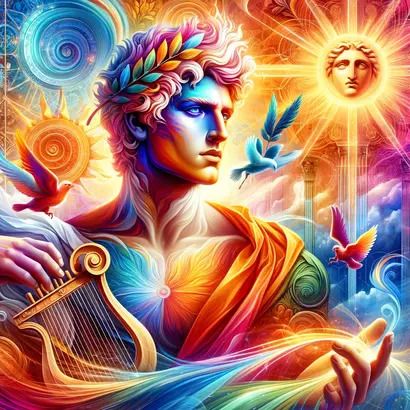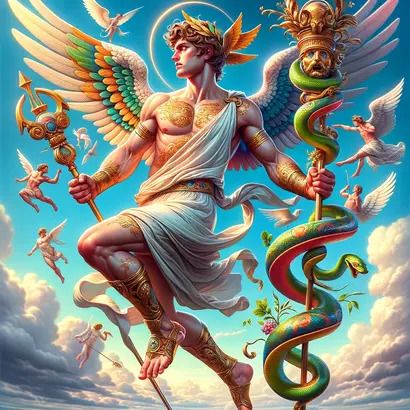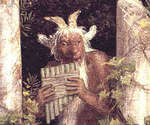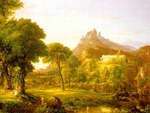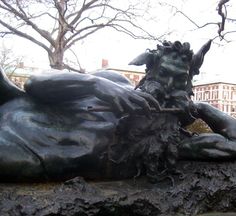
Pan
Part man and part goat, Pan was the god of wild groves, shepherds, and flocks. Born in Arcadia to Hermes and a Dryad, Pan was a precocious child whose goat’s feet and horned head delighted gods, but startled mortals. Nymphs weren’t too happy with his looks either and, as much as Pan loved them, they almost never loved him back. One of them, Syrinx, chose to be transformed into marsh reeds to save herself from Pan’s advances. Pan cut the reeds and joined them side by side in decreasing order, thus creating the very first set of panpipes. Ever since then, he was rarely seen without the instrument.
Family
Pan’s parentage is a bit ambiguous, but, according to most sources, he was the son of Hermes and a Dryad, whether Dryope (the daughter of the Arcadian hero Dryops) or Penelope of Mantineia. Possibly due to a name-confusion error, even early authors sometimes make him the son of Odysseus’ wife, typically keeping Hermes as his father, but sometimes swapping him for Apollo. According to the oddest one of these stories, Pan didn’t have a divine parent at all, but was, in fact, the fruit of Penelope’s affair with all of her 108 suitors!
Pan’s Role
Pan was born a mature child in Arcadia; his distinct appearance (half goat, half man) delighted the hearts of all gods, which is why they named him “Pan” (meaning “all”). In addition, Pan’s name is the basis from which the word panic is ultimately derived.
Portrayal
Much like his father Hermes, Pan seems to have been a precocious child. “From his birth,” sings the poet of “The Homeric Hymn to Pan,” he “was marvelous to look upon, with goat's feet and two horns – a noisy, merry-laughing child.” This feeling, however, wasn’t shared by his nurse, who fled and left Pan the very moment she saw his uncouth goat-horned face and full beard.
Name
Gods tend to see things differently from mere mortals, so it should surprise nobody that, once Hermes wrapped Pan in warm skins of mountain hares and brought him before the Olympians, “all the immortals were glad in heart.” In fact, since “Pan” means “all” in Ancient Greek, it was believed that the origin of Pan’s name could be traced back to this event.
Realm and Role
Pan’s homeland – and the main seat of his worship – was Arcadia, the mountainous, wild, and rustic central region of Peloponnese. Here the god spent most of his days wandering the forests, playing haunting melodies on his pipes, chasing nymphs, and taking naps in secluded places during the heat of the noontide.
Pan’s Shout
For most of the time, the great god was both an amusing and amiable presence – but he loved his naps even more than he loved his nymphs; which explains why the Ancient Greeks believed it was fairly dangerous to disturb them. Once upset, Pan was known to be able to let out an angry, blood-curdling shout which inspired a sudden sensation of fear and anxiety in everyone unfortunate enough to hear it.
Even now, they say, Pan’s unseen presence in these lonely and rocky mountainous places causes people to be suddenly overwhelmed with a feeling of frantic agitation and distress. To this day, the feeling bears the name of the rustic god: panic.
Pan and Music
Pan was the inventor of a musical instrument – called the panpipes or syrinx – which he learned to play so well that he even ended up challenging Apollo himself to a musical contest; unsurprisingly, he lost.
Syrinx
A beautiful nymph, Syrinx was a follower of Artemis, which means that she valued her chastity above all things in life. Unfortunately for her, once he saw her, Pan made the opposite his priority, so he started relentlessly pursuing her through the woods of Arcadia.
Once Syrinx reached the river Ladon, she realized that she could go no further, so she started praying to the river-nymphs to save her. And they did: they transformed her into a bunch of marsh reeds the very moment Pan spread his hands to grab her.
Once he realized that he was embracing shrubs instead of a nymph’s body, Pan sighed with disappointment. To his amazement, the sigh shook the grass-like plants he held in his embrace and they, in turn, gave off a beautiful melody. Mesmerized by it, Pan cut the marsh reeds into different lengths and joined them side by side in decreasing order.
Thus, the god created the first set of panpipes, which, in remembrance of his lost love, he chose to name syrinx. Some Arcadian shepherds still play the very same instrument.
The Musical Contest
Pan became a great musician, and everybody admired his playing. However, he was no match for Apollo and, predictably, once he resolved to challenge the Olympian, he lost almost unanimously the subsequent musical contest. Midas, the king of Phrygia, was the only one who gave the victory to Pan. Apollo thought this vote called for a fitting gift, so he rewarded Midas with a pair of asses’ ears.
Pan and His Nymphs
Pan was a lecherous god, so Syrinx wasn’t the only nymph he tried pursuing. However, even though he wasn’t at all picky when it came to women, he was just too odd and unattractive to be loved back by them.
Pitys was another nymph who preferred to be transformed into a plant (in her case, the pine tree) to being Pan’s object of desire. And Echo was too infatuated with Narcisse to even notice the advances of the pastoral god.
He did complete one pretty admirable conquest, though: that of Selene, the moon goddess, whom he tricked by wrapping himself in sheepskin and luring her into the woods as she was riding her silver chariot through the night.
The Death of Pan
As the Egyptian sailor Thamus was sailing along the western coast of Greece in the first years of the Christian era, he heard a divine voice claiming that “the great god Pan is dead.” If true, this would make Pan one of the very few Greek gods – if not the only one – to actually die.
Pan Sources
“The Homeric Hymn to Pan” tells of Pan’s miraculous birth. In the “Metamorphoses,” Ovid recounts both Pan’s pursuit of Syrinx and his musical contest with Apollo. Check out Plutarch’s “The Uselessness of Oracles” if you want to read more about the proclamation of Pan’s possible death.
See Also: Hermes, Syrinx, Apollo, Arcadia
Pan Video
Pan Q&A
Link/Cite Pan Page
Written by: The Editors of GreekMythology.com. GreekMythology.com editors write, review and revise subject areas in which they have extensive knowledge based on their working experience or advanced studies.
For MLA style citation use: GreekMythology.com, The Editors of Website. "Pan". GreekMythology.com Website, 03 Dec. 2020, https://www.greekmythology.com/Other_Gods/Pan/pan.html. Accessed 26 April 2024.

